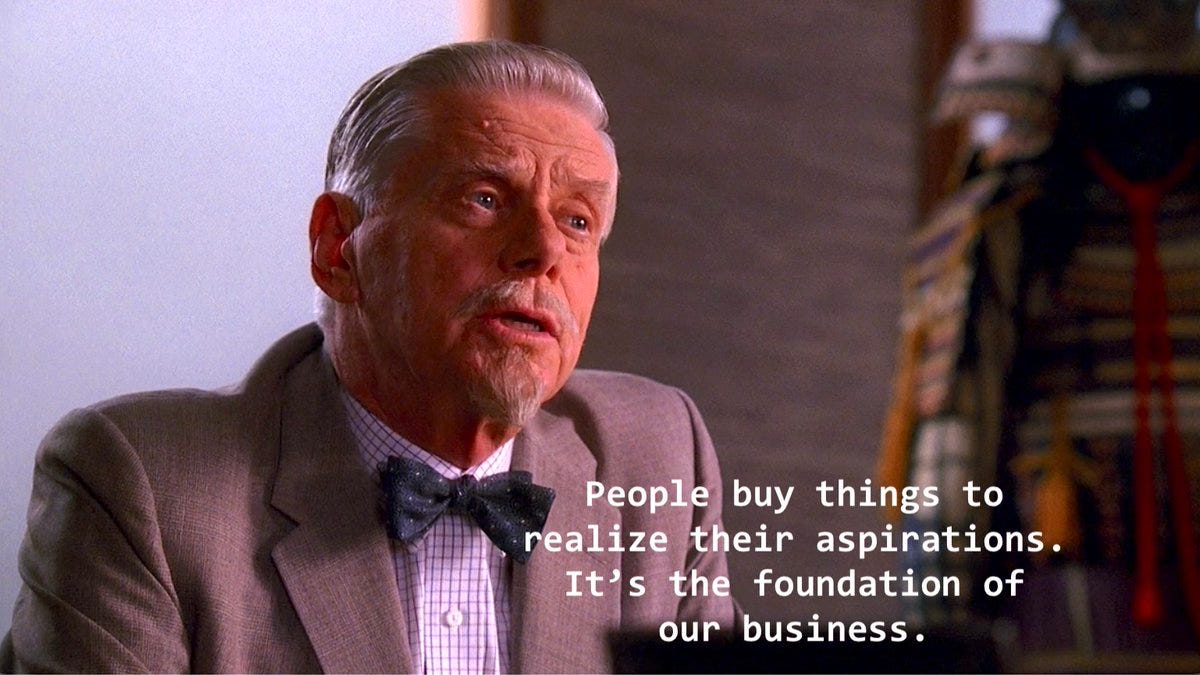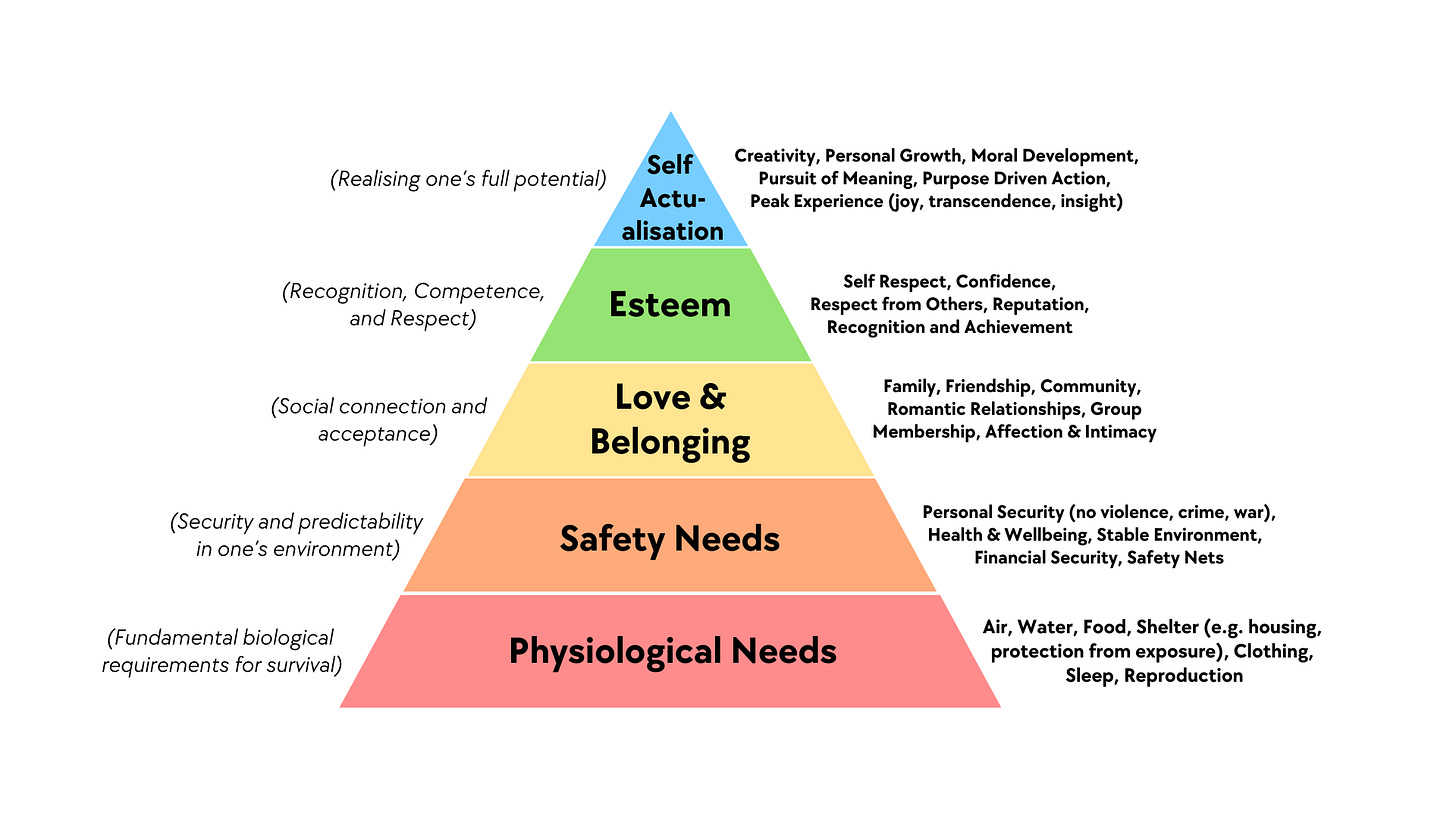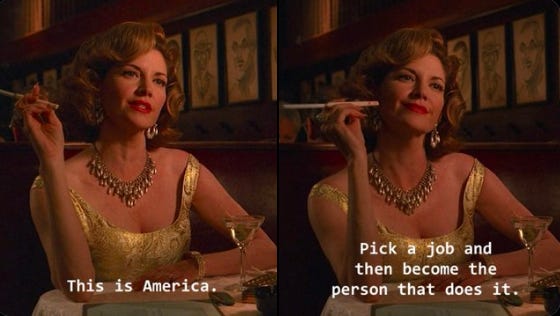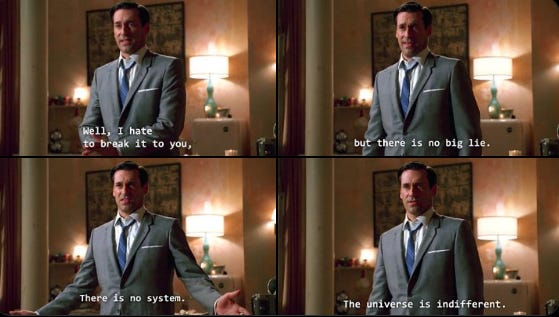Mad Men, Self-Actualization and Being Curious About Who You Want to Become
Don Draper would have loved Instagram
Mad Men recently celebrated the 10th anniversary of its final episode, which is as good a reason as any to re-position it as a central piece of TV culture. It was one of the first “prestige” shows and it won a whole heap of awards, but that’s not why we should keep it around.
If any show effectively showcased and deconstructed modern America, I’d argue it was Mad Men. It sets up many of the deep issues that our country still struggles with today. I could put thousands of words into why that’s true, but the core of it is this:
Modern Americans don’t know what they want unless other people tell them.
Pre-WWII America was defined by its struggles. Whether they were gaining independence from England, colonizing the frontier, grappling with slavery, or dealing with the depression, there was always a sense of upheaval that kept everyone focused on survival. As anyone who understands Maslow's hierarchy of needs would tell you, this means that self-actualization was fairly far away for the Average American.
Since survival was all that mattered, we held survivors in the highest esteem, and that was a core part of the national identity. When WWII ended, however, we entered into a vastly different economic and cultural situation. The old world was a pile of rubble, Americans were heroes, and times at home were relatively easy. Everyone got a job, a house, a community, and most importantly, discretionary spending. While we can certainly muddy the good vibes by discussing Vietnam, the Cold War and 9/11, the reality is that by Maslow’s standards Americans had it good.
This level of economic and geopolitical success is historically rare and we often neglect to consider how it has negatively impacted America’s resilience today. Because once you’re no longer struggling to survive, you begin to struggle in unpredictable ways.
Under peaceful conditions the warlike man attacks himself.
— Friedrich Nietzsche
With life getting easier for the rising middle class, we began to see the explosion of consumerism and advertising, which is now upstream of how people define themselves today. We find our identity in the vacations we take, the products we buy and the brands we support. This form of identity has overtaken community, religion, and sometimes, even politics. In this era, self-actualization could appear to come from your spending habits, which wasn’t true, but it felt nice.
This pattern of buying your way to happiness was ultimately damaging for the average Americans that ad agencies worked to influence. But Mad Men also showed how it impacted everyone who worked there, including Don Draper. While talented and charismatic, he drifted through life without knowing what he wanted, redefining himself based on what was thrown at him and using that journey to better sell engaging narratives to his clients.
“Life Sims” and Self-Actualization as a Product
Let’s return to 2025, where life simulators are one of the fastest-growing video game genres. In these types of games, players can simulate aspects of reality in a low stakes, simplified environment. Whether they are recreating an entire human’s life like they can in The Sims and Animal Crossing, or taking on the role of a long-haul truck driver in American Truck Simulator, the end result is hours spent on a screen playing out an imagined version of what their future could be.
Many people just play these games for fun, and I’m not here to denigrate that. However, subcultures around these games indicate that their most devoted fans tend to replace real-world actualization with a virtual replica.
This trend could be caused by numerous economic, technologic and cultural barriers. Dreams have never felt harder to accomplish for Gen Z and millennials. The timing makes sense, and the benefits are obvious. In these games, the friction is removed. You don’t need to obtain certifications, get hired, build an audience, or any of the other hurdles that exist for people trying to make their real-world dreams come true.
I’ve learned a lot from video games, so a final disclaimer is warranted. Self-actualization may indeed be supported by these simulations. For example, someone could turn an interest in Stardew Valley into a career in agriculture. Maybe a high schooler gets the courage to ask out their crush after testing it out on their computer. This trend doesn’t have to be as dystopian as it sounds.
Another possibility is that technology catches up to this behavior by turning some of our careers into coordination games between AI agents that we manage for economic purposes. As Peter Drucker once said: “The future of work is not about jobs, but about doing things we like to do in the way we like to do them. In the future, work will look more like what people do on weekends.” Maybe he is right, and our jobs will look a lot like video games in the future.
However, we should consider the opportunity cost in relying on these forms entertainment rather than building our own unique path in life. For the most part, these are still consumer products, not tools designed to enlighten us.
The stakes are high to align our culture toward better paths to build an authentic identity. Young people today face rising levels of loneliness, depression and addiction, which can all be symptoms of a self-actualization journey stuck in neutral.
“People would avoid using fentanyl if they felt like they could own a home and raise a family and start their own business and become economically secure, but there’s now a set of circumstances where fentanyl is 80 cents a pill and nobody can get a loan to buy property.”
— Rep. Marie Gluesenkamp Perez on Doomer Optimism
Calibrating for Curiosity and Authenticity
The primary issue is that true self-actualization is hard. The modern world has made it simple to avoid the long work of authoring our own lives. For example, you could pursue what your parents want for your future. Or maybe you end up sidetracked by vices such as gambling, gaming and fentanyl. If you’re successful but uncreative, you could be enticed to copy and paste the identity of a popular influencer that sells a lifestyle to you online.
These shortcuts are everywhere, and nobody has an incentive to discover unique alternatives. Your authentic self will not be presented to you in a box. Avoid the short-term satisfaction of chasing phony self-actualization!
Marketing, celebrities and media helps to obfuscate what we see and who we idolize. With technology, this often goes a step further. Social media algorithms often suppress individuals who do their own thing. People who don’t optimize content for engagement can be deprioritized until they disappear from our feeds, and eventually our lives. For these people, and others looking to learn more from the individuality of others, it will appear as if true individuals don’t exist.
Resisting this onslaught of other people telling you what you should want is a life-long battle, but there is joy to be found in that fight. For all of us, self-actualization could look like any combination of paths presented to us through books, culture, and yes, even advertising. The value is in making that mix as unique as possible.





